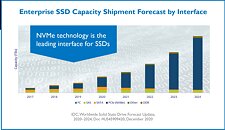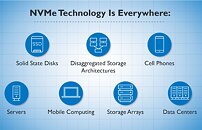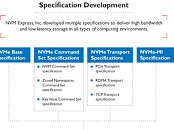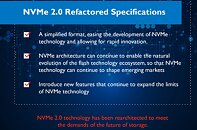- Joined
- Oct 9, 2007
- Messages
- 47,538 (7.47/day)
- Location
- Hyderabad, India
| System Name | RBMK-1000 |
|---|---|
| Processor | AMD Ryzen 7 5700G |
| Motherboard | ASUS ROG Strix B450-E Gaming |
| Cooling | DeepCool Gammax L240 V2 |
| Memory | 2x 8GB G.Skill Sniper X |
| Video Card(s) | Palit GeForce RTX 2080 SUPER GameRock |
| Storage | Western Digital Black NVMe 512GB |
| Display(s) | BenQ 1440p 60 Hz 27-inch |
| Case | Corsair Carbide 100R |
| Audio Device(s) | ASUS SupremeFX S1220A |
| Power Supply | Cooler Master MWE Gold 650W |
| Mouse | ASUS ROG Strix Impact |
| Keyboard | Gamdias Hermes E2 |
| Software | Windows 11 Pro |
NVM Express, Inc. today announced the release of the NVM Express (NVMe ) 2.0 family of specifications. The restructured NVMe 2.0 specifications allow for faster and simpler development of NVMe solutions to support the increasingly diverse NVMe device environment, now including Hard Disk Drives (HDDs). The extensibility of the specifications encourages the development of independent command sets like Zoned Namespaces (ZNS) and Key Value (KV) while enabling support for the various underlying transport protocols common to NVMe and NVMe over Fabrics (NVMe-oF ) technologies.
"NVMe technology is the leading interface for SSDs, with overall worldwide enterprise SSD capacity expected to grow at a 43% compound annual growth rate into 2024," said Jeff Janukowicz, research vice president, IDC. "NVMe architecture is designed for future SSD development and form factors, as we enter a new era in hyperscale and enterprise computing that drives digital transformation."




"We have rearchitected the NVMe 2.0 library of specifications to meet the evolving demands of the future of storage," said Amber Huffman, NVM Express president. "NVMe technology has unified client, cloud and enterprise storage around a common command set and architecture. Our Technical Work Group has worked diligently to optimize the features of the NVMe 2.0 specifications for diverse market segments, allowing for emerging use cases and opening new NVMe device types."
NVMe 2.0 Specifications: New Layout Will Propel Industry Development and Momentum
The NVMe 2.0 library of specifications consist of multiple documents, including the NVMe Base specification, Command Set specifications (NVM Command Set specification, ZNS Command Set specification, KV Command Set specification), Transport specifications (PCIe Transport specification, Fibre Channel Transport specification, RDMA Transport specification and TCP Transport specification) and the NVMe Management Interface specification.
The new specifications will facilitate the emerging NVMe device ecosystem, including enterprise and client solid state drives (SSDs), removable cards, compute accelerators and HDDs.
Key NVMe 2.0 Features:
View at TechPowerUp Main Site
"NVMe technology is the leading interface for SSDs, with overall worldwide enterprise SSD capacity expected to grow at a 43% compound annual growth rate into 2024," said Jeff Janukowicz, research vice president, IDC. "NVMe architecture is designed for future SSD development and form factors, as we enter a new era in hyperscale and enterprise computing that drives digital transformation."




"We have rearchitected the NVMe 2.0 library of specifications to meet the evolving demands of the future of storage," said Amber Huffman, NVM Express president. "NVMe technology has unified client, cloud and enterprise storage around a common command set and architecture. Our Technical Work Group has worked diligently to optimize the features of the NVMe 2.0 specifications for diverse market segments, allowing for emerging use cases and opening new NVMe device types."
NVMe 2.0 Specifications: New Layout Will Propel Industry Development and Momentum
The NVMe 2.0 library of specifications consist of multiple documents, including the NVMe Base specification, Command Set specifications (NVM Command Set specification, ZNS Command Set specification, KV Command Set specification), Transport specifications (PCIe Transport specification, Fibre Channel Transport specification, RDMA Transport specification and TCP Transport specification) and the NVMe Management Interface specification.
The new specifications will facilitate the emerging NVMe device ecosystem, including enterprise and client solid state drives (SSDs), removable cards, compute accelerators and HDDs.
Key NVMe 2.0 Features:
- The ZNS specification provides a zoned storage device interface that allows the SSD and host to collaborate on data placement. ZNS permits data to be aligned to the physical media of the SSD, improving overall device performance and cost while increasing the media capacity that can be made available to the host.
- The KV Command Set provides access to data on an NVMe SSD controller using a key rather than a block address. KV allows applications to directly communicate with the drive using key-value pairs, avoiding the overhead of translation tables between keys and logical blocks.
- Namespace Types provides a mechanism to allow an NVMe SSD controller to support the different command sets that are defined as part of the NVMe 2.0 release as well as a path for future command sets.
- NVMe Endurance Group Management enables media to be configured into Endurance Groups, exposing granularity of access to the SSD and improving control.
- Rotational Media support enables support for HDD on NVMe technology with updates to features, management capabilities and other enhancements required for HDD support.
- Multiple Controller Firmware Update defines behavior for firmware updates on complex systems with multiple controllers.
- Shutdown enhancements enable showdown control from enclosure management for simplified management of many drives at once.
- Simple Copy Command copies data from one namespace in the drive, offloading the copy operations from multiple source LBAs to a single destination LBA.
- 32/64 bit CRC expands the protection information and data protection to 32 and 64 bit allowing for new types of meta data use cases.
- Command Group Control prevents unintended changes after a system is provisioned and protects the system from unintentional or malicious changes.
- NVMe 2.0 specifications maintain backwards compatibility with previous NVMe generations.
View at TechPowerUp Main Site






